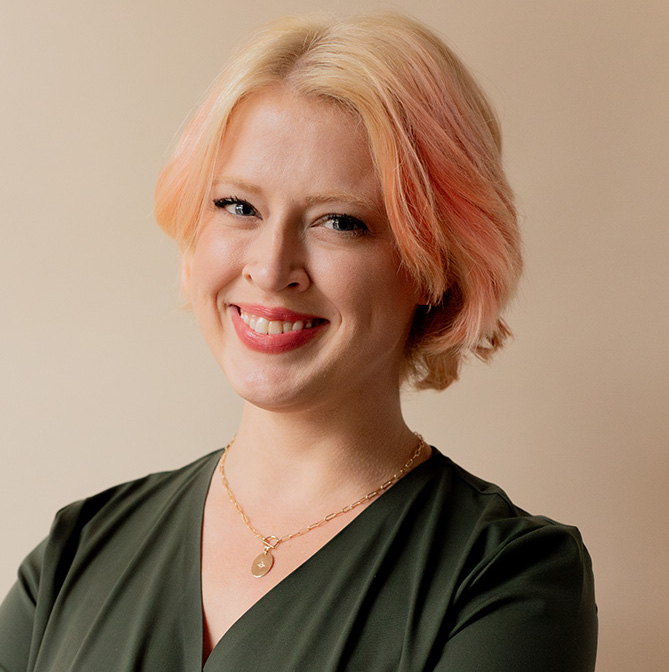
Our Editors On What We Wish We Would’ve Known When We Graduated
Happy Graduation!
It’s that time of year—graduates are stepping into the “real” world in droves, seeking their dream jobs and exploring the transition between student life and the working world. It’s a period of life that requires grace and patience in the face of expectations and worry. This season also calls to mind the lessons we’ve learned along the way, and everything we’d love to tell our younger selves.
Whether you’re graduating high school, college, or just feeling the pull of transition into the next phase of your life, we feel you. Our editors sat down for a roundtable discussion about what we wish we would have known when we graduated—and discovered that it wasn’t all just advice for writing a resume or navigating student loans. Here’s what we discussed.
What do you wish you had known when you graduated?
Emily, Managing Editor: I wish I would have known how to be patient and to not force things. When I graduated, I went into the workforce feeling like I had to do everything. I wish I would have followed my curiosity and my whims a little bit more, rather than trying to force myself to know everything about social media or marketing or media outreach. I wish I would have embraced that flow a little bit better.
“When I graduated college, I went through a long phase of promoting my degree versus promoting who I am, what my passions were, and what I was trying to do.”
Courtney, Associate Editor: I felt that way too, actually. When I graduated college, I went through a long phase of promoting my degree versus promoting who I am, what my passions were, and what I was trying to do. I felt that I went to school and got this fashion degree, so I’m doing fashion—versus asking, “What do I want to do, now that I’m done with college? Where do I want to go?”
Emily: Things are a lot more flexible than what your diploma says.
Courtney: I made my resume strictly based off of a class I took that taught us how to make our resumes. Which was great—it was the way we were meant to make a resume at the time, but it didn’t have my personal touch. It was what my teachers would have given me an A for.
Belinda, Assistant Editor: It’s okay to be in the wrong field or the wrong job, and not in your “dream job” immediately after you graduate. It’s a journey and most people aren’t going to stay in the first job they find after graduation for the rest of their life.
“It’s okay to be in the wrong field or the wrong job, and not in your “dream job” immediately after you graduate.”
Every experience I’ve had—I’ve worked in a lot of different industries and roles—has helped me grow as a person and in my career. I don’t regret any of it, even though some of it at the time I wondered, “Why am I doing this?”
Emily: It’s easy to get sucked into the idea that your first job will be the job you’ll be at for 30 years, because that’s what a lot of our parents experienced. That’s not the case anymore. It’s stressful to feel like you have to get it right the first time. And if you hate that first job, you think you’re stuck with it. But that’s not true.
AmyAnn, Co-Founder: My thoughts are similar to Belinda’s. I wish I would have given myself a bit more room to enjoy the jobs that I did not feel were a culmination of my passions or my personality. There’s an expectation, especially within our generation, to feel that our work sums up our sense of meaning.
Now I can see I was learning really valuable skills in these roles, but not everything about them was aligned or inspiring. I would have wanted to feel more permission to be like, “I’ll get there eventually”—or I won’t, and I’ll find a sense of purpose or actualization outside of work.
Courtney: Yeah, this patience with yourself—it’s not taught or discussed. You get out of college and hit the ground running, but I wish I would have sat down and told myself, “It’s gonna take some time.”
Don’t freak out and don’t be so concerned about going home for Christmas and telling everyone, “I got my dream job after college.” There’s a lot of pressure from family when you graduate—just have patience.
“Every step of the way—even if it’s terrible at the time—you learn about what you want, or something valuable for your next job, or you’re learning what you don’t want in a career.”
Emily: And to get more comfortable being uncomfortable, and saying this isn’t right for me right now. Maybe you are experiencing that pressure from friends or family to either love your job or move on. Every step of the way—even if it’s terrible at the time—you learn about what you want, or something valuable for your next job, or you’re learning what you don’t want in a career. I think that last one is an important lesson, even though it doesn’t always feel like a productive one.
AmyAnn: Celeste, do you have any thoughts? You’re not so far removed.
Celeste, Social Media Coordinator: Yeah, I’m coming from a different perspective because I love working here, and this is my first job. I didn’t have to go through those same job issues.
Courtney: You did something that was unique, with your degree, that you’ve talked about. You had a moment of, “I don’t know if this is for sure I want to do for the rest of my life.”
Celeste: I majored in screenwriting in college, and so people always ask, “Are you working in film now?” Sometimes I wonder, “Did I mess up?” But also, I’m so content where I’m at. So it’s learning to understand that some people will still have certain expectations for me, but that doesn’t mean that I’ve messed up. Because I know that I’m good where I’m at.
“Sometimes when you’re in school, the years feel very connected, and now the world is so much bigger—it’s continually expanding every year.”
As far as things that I wish I had known, or something that I’m still kind of telling myself, is that so much can change in a year. When I graduated, it felt like the world was ending because all my friends moved away and I was going through a terrible breakup. It’s been a year now, and I look back and I see that so much has changed. The world is so much more open now. Sometimes when you’re in school, the years feel very connected, and now the world is so much bigger—it’s continually expanding every year. That’s something that’s comforted me.
AmyAnn: There’s an interesting theme here around expectations. For me, it’s an inverse relationship—the more weight I’ve placed on other people’s expectations, the less happy I’ve been in my life in general. But definitely with my career—right after college I remember interviewing for jobs and trying titles on in my mind and considering what would so-and-so would think, and this meant more to me than my own leanings towards a certain path or another.
I had a job in alumni relations for a university and it was easy to tell family and friends about that role, and they were supportive. I worked at a law firm, easy to explain, people were supportive. I start my own business, an internet business, and I’m trying to explain what sustainability and social impact is—and nobody gets it. In that moment, I realized it’s totally fine. I’m perfectly whole without that external validation because I found this thing that I love, and it’s worth it. I’m so much more thrilled to say, “Sure, you can call me a blogger or you can call me an investor—whatever you want to call me, I don’t care.”
Emily: It’s also easy to think that releasing other people’s expectations is just something you can do, but I’ve found in the years since I graduated, and as I’ve gotten older, it’s a skill. It’s something you have to practice and it’s not going to happen overnight. Some days it’s better than others, some days you’re like “I don’t care what anybody thinks at all” and then the next day you’re wondering, “What could they possibly be saying about me, and what do they think of me.” It can be stifling.
“I’ve learned to move forward despite [people’s expectations] and to be confident and comfortable with my own intuition and inclinations.”
AmyAnn: Good point. I don’t think I’ve learned to release people’s expectations. I think I’ve learned to move forward despite them and to be confident and comfortable with my own intuition and inclinations.
Courtney: I was the same way, after college I went to work in the fashion industry because I graduated with a fashion degree, and everything I was doing was like—what can I go home and tell my grandparents and my aunt and uncle? What kind of fashion careers can I have that will make them understand?
AmyAnn: And what makes them comfortable.
Courtney: As I’ve moved more and more and more into a space that’s outside of the box, it’s been like beating against a wall trying to explain what I do. I went through such a transition period of being upset when people didn’t understand what I did, and being sad and frustrated. I had all these doubts about why I couldn’t communicate what I was doing, and I felt if I couldn’t do that, then is this work even meant for me? Just release the idea that you even have to explain yourself. If you’re happy in what you’re doing, then that’s all that matters.
Celeste: It’s sometimes helpful for other people to feel like they can understand you and categorize you.
Courtney: Exactly.
Celeste: My family says “Celeste writes for The Good Trade”—but they don’t say that my full title is Social Media Coordinator. It doesn’t bother me—I mean it does—but I realize they need that to be able to categorize me to their friends and coworkers. So let them do it.
Belinda: I once worked for an IRB—an institutional review board—in the noncompliance department. An IRB works with pharma companies’ research studies involving human participants. That was always such a challenge, and mouthful, to explain. Like I’d go on and on trying to make what I do make sense to the average person who asks.
It’s hard when you can’t just say you’re a lawyer or teacher, and you have to break it down, but a lot of jobs are like that now.
AmyAnn: Yeah, and it’s also okay to take up the space to educate people about what you do. I remember I put a sticky note on my mom’s fridge about what The Good Trade is and what she could tell her friends—or maybe she even put the sticky note up—but she memorized it and she totally got it.
Emily: That’s a good idea.
Belinda: That is!
Celeste: My mom definitely knows that I’m the Social Media Coordinator—she just doesn’t understand how I can possibly work on social media for seven hours a day.
Emily: Years ago, I was talking to my grandma on the phone and I was telling her that I got this new job. And she was like, “That’s great. So do you work on the internet or do you work for the internet?”
Belinda: (laughs) Oh, wow.
Courtney: We all work for the internet!
Celeste: We are the internet headquarters.
RELATED READING
Emily Torres is the Managing Editor at The Good Trade. She’s a Los Angeles transplant who was born and raised in Indiana, where she studied Creative Writing and Business at Indiana University. You can usually find her reading or writing, caring for her rabbits, or practicing at the yoga studio. Say hi on Instagram!

